
The UNESCO-UNEVOC International Centre: Who We Are | What We Do | Working With Us | Get in Touch
The UNEVOC Network: Learn About the Network | UNEVOC Network Directory
For Members: UNEVOC Centre Dashboard
Thematic Areas: Inclusion and Youth | Digital Transformation | Private Sector Engagement | SDGs and Greening TVET
Our Key Programmes & Projects: BILT: Bridging Innovation and Learning in TVET | Building TVET resilience | TVET Leadership Programme | WYSD: World Youth Skills Day
Past Activities: COVID-19 response | i-hubs project | TVET Global Forums | Virtual Conferences | YEM Knowledge Portal
Our Services & Resources: Publications | TVET Forum | TVET Country Profiles | TVETipedia Glossary | Innovative and Promising Practices | Toolkits for TVET Providers | Entrepreneurial Learning Guide
Events: Major TVET Events | UNEVOC Network News
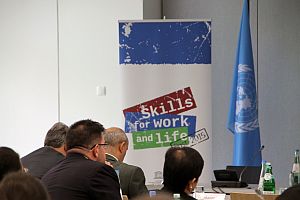 Youth employability and green skills were at the core of the global forum “Skills for Work and Life Post-2015”, organized by the UNESCO-UNEVOC International Centre for Technical and Vocational Education and Training. From 14 to 16 October 2014, over 200 delegates from 65 UNESCO Member States, including 67 participants from 62 UNEVOC Centres, convened at the United Nations Campus in Bonn, Germany, to discuss the role of technical and vocational skills in addressing two major global challenges on the post-2015 development agenda: making youth employable and achieving sustainable development.
Youth employability and green skills were at the core of the global forum “Skills for Work and Life Post-2015”, organized by the UNESCO-UNEVOC International Centre for Technical and Vocational Education and Training. From 14 to 16 October 2014, over 200 delegates from 65 UNESCO Member States, including 67 participants from 62 UNEVOC Centres, convened at the United Nations Campus in Bonn, Germany, to discuss the role of technical and vocational skills in addressing two major global challenges on the post-2015 development agenda: making youth employable and achieving sustainable development.
The three-day forum brought together international experts from various organizations and UN agencies, policymakers, practitioners, researchers, the private sector, social partners, youth representatives as well as members of the UNESCO TVET community from headquarters and field offices.
“For the past years, we have worked closely with our global network to come up with a shared vision for TVET, prioritizing youth and sustainable development”, explained Shyamal Majumdar, Head of UNESCO-UNEVOC. “Now, it is time to translate this vision into concrete interventions and actions for the advancement of TVET worldwide.”
With the support of the German Federal Ministry for Economic Cooperation and Development (BMZ)![]() , the Ministry of Education and Research (BMBF)
, the Ministry of Education and Research (BMBF)![]() and in collaboration with the Institute for Vocational Education and Training and Research (BIBB)
and in collaboration with the Institute for Vocational Education and Training and Research (BIBB)![]() , the Society for International Cooperation (GIZ)
, the Society for International Cooperation (GIZ)![]() , the Foreign Office
, the Foreign Office![]() and the National Commission for UNESCO, the Forum was successful in guiding the way forward and in informing the global debate of TVET’s transformative capacities. Such capacities could ease the transition of young people to a productive personal and professional life and could help communities and societies seize the job potentials of the post-2015 development scenario.
and the National Commission for UNESCO, the Forum was successful in guiding the way forward and in informing the global debate of TVET’s transformative capacities. Such capacities could ease the transition of young people to a productive personal and professional life and could help communities and societies seize the job potentials of the post-2015 development scenario.
Speaking at the opening plenary session of the Forum, BMBF's Deputy Director General Maximilian Metzger noted that “vocational education has become a forward-looking topic worldwide and UNEVOC is an important platform”, confirming support from the host country for the work of UNESCO-UNEVOC and for TVET interventions around the world.
The contributions made at the global forum served to clarify the role of TVET in the post-2015 development agenda as well as to highlight certain challenges to overcome.
The need to take an integrated view of TVET for the world of work and for professional and personal development, as well as for addressing sustainable development issues was a resounding message drawn from the forum.
TVET has the potential to be transformative in the lives of individuals and communities around the world. To realize this potential, however, participants stressed the necessity of avoiding the false dichotomy between work and life. There was broad consensus that policy must reflect a coherent vision for TVET in which the notion of skills for both life and work is well integrated. Skills, the participants shared, are not only necessary for employability, productivity and competitiveness but also for community development, social cohesion and addressing environmental issues. In this respect, there was agreement that the challenges of youth employability and skills on the one hand, and greening TVET on the other must be dealt with as a single issue in an integrated manner rather than on separate tracks as was the case in the past.
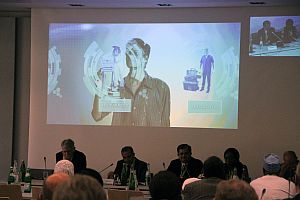
The conclusions resonated contributions of the UNEVOC Network in taking forward the Shanghai call to improve the evidence base on TVET. At the global level, cases of what works for greening TVET and fighting youth unemployment need to be further documented and shared. There is a strong need to stimulate practices in which employability and greening the economy are seen as integrated rather than independent issues.
To enhance TVET’s ability to shape a new international development agenda, policymakers and practitioners agreed that an approach of learning by doing would need to be adopted. The Forum featured practices that demonstrated the transformative potential of TVET and provided practical insights for how to go about upgrading TVET systems to address common development challenges.
All UNEVOC Network members had been invited to showcase how TVET is being oriented to the demands of greening the economy and addressing youth unemployment at the level of their school or institution, their region or their country. The aim of this exercise was to share knowledge of established innovative practices – 'success stories' – that have proven to be effective and that promote TVET in some profound way.
Some of the most promising, interesting and inspiring practices from each of the five regions and on each of the two themes – green skills and youth employment – were discussed at the Global Forum. The presentations were accompanied by short films as visual evidence of how the practice has been implemented.
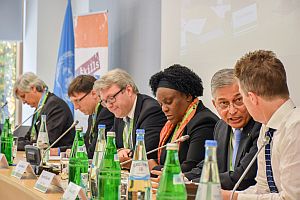 This session brought together representatives from five Bonn-based United Nations agencies to discuss youth employability and green development as complementary and mutually reinforcing. It was a landmark session as it was the first time that the UN agencies in Bonn came together to discuss human resource development in the context of sustainability and to propose ideas for addressing the challenges of climate change, loss of biodiversity and desertification through technical and vocational education and training and youth employment. Chaired by Marc Jan Eumann, Minister for Federal Affairs, Europe and Media of North Rhine-Westphalia, the session brought together representatives from UN Volunteers (UNV)
This session brought together representatives from five Bonn-based United Nations agencies to discuss youth employability and green development as complementary and mutually reinforcing. It was a landmark session as it was the first time that the UN agencies in Bonn came together to discuss human resource development in the context of sustainability and to propose ideas for addressing the challenges of climate change, loss of biodiversity and desertification through technical and vocational education and training and youth employment. Chaired by Marc Jan Eumann, Minister for Federal Affairs, Europe and Media of North Rhine-Westphalia, the session brought together representatives from UN Volunteers (UNV)![]() , the United Nations Convention to Combat Desertification (UNCCD)
, the United Nations Convention to Combat Desertification (UNCCD)![]() , UNESCO-UNEVOC, the UN Platform for Space-Based Information Systems (UN-SPIDER)
, UNESCO-UNEVOC, the UN Platform for Space-Based Information Systems (UN-SPIDER)![]() and the Climate Change Secretariat (UNFCCC)
and the Climate Change Secretariat (UNFCCC)![]() . It was evident from the discussion that there is ample opportunity for synergy and collaboration among the Bonn-based agencies to work together in addressing the human resource and skills challenges in the post-2015 scenario. Several proposals were presented in this regard.
. It was evident from the discussion that there is ample opportunity for synergy and collaboration among the Bonn-based agencies to work together in addressing the human resource and skills challenges in the post-2015 scenario. Several proposals were presented in this regard.

The Inter-Agency Working Group (IAWG) for Greening TVET is a group of multilateral organizations facilitated by UNESCO-UNEVOC that jointly supports initiatives and policy measures for greening TVET and skills development. The session of the IAWG, which was represented by UNESCO, the International Labour Organization (ILO)![]() , the Organisation for Economic Co-operation and Development (OECD)
, the Organisation for Economic Co-operation and Development (OECD)![]() , the European Training Foundation (ETF)
, the European Training Foundation (ETF)![]() and the http://[www.cedefop.europa.eu
and the http://[www.cedefop.europa.eu![]() European Centre for the Development of Vocational Training (CEDEFOP)] and which was chaired by Borhene Chakroun, Section Chief for TVET at UNESCO in Paris, provided a platform for inter-agency exchange and mutual learning as well as for informing the global debate on the key approaches and priorities that must be taken to make TVET a priority on the sustainable development agenda.
European Centre for the Development of Vocational Training (CEDEFOP)] and which was chaired by Borhene Chakroun, Section Chief for TVET at UNESCO in Paris, provided a platform for inter-agency exchange and mutual learning as well as for informing the global debate on the key approaches and priorities that must be taken to make TVET a priority on the sustainable development agenda.
In this respect, the IAWG highlighted a number of key steps:
Awareness-raising: for many policy- and decision-makers, the purpose of TVET and its role in contributing to sustainable development remains unclear. Undertaking awareness raising activities to clarify the purpose of TVET and demonstrate its potential to realize the sustainable development goals of a given country can strengthen TVET’s positional on the national development agenda.
Evidence-based research: Documenting lessons learned from promising TVET practices can provide practical insights into the role that TVET might play in further accomplishing sustainable development goals. The usefulness of documenting such lessons was highlighted at the Forum itself during the session on Promising Practices.
Empirical research: The impacts of TVET on development outcomes and on the economy in general have not been well supported by empirical evidence. Agencies and institutions in charge of TVET can take steps to alleviate this challenge by commissioning studies that quantify the impact of TVET systems on sustainable development outcomes. Among the questions that might be considered are the effect of TVET in stemming youth unemployment or the impact of vocational training in expanding the size of low-carbon sectors in the economy.
Policy coordination: Enhancing coordination at the Ministerial level can help avoid policy fragmentation that sometimes besets efforts to strengthen TVET. TVET and the idea of “Greening TVET” can be considered from a multi-sector perspective. Members of the IAWG explained, for example, that “Greening TVET” is as much an environmental issue as it is a socio-economic, educational or labour related one. Viewing TVET from as all-encompassing agenda issue can emphasise its contribution to sustainable development.
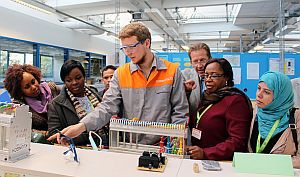 On the last day of the Forum, five study tours took the delegates to several companies in and around Bonn. Capacity building and the promotion of networks and partnerships being one of UNESCO-UNEVOC’s core areas of work, the objective of the study tours was to give the conference delegates the opportunity to witness, first-hand, German flagship initiatives ranging from innovation, research and education technology to renewable energies and the German vocational training system.
On the last day of the Forum, five study tours took the delegates to several companies in and around Bonn. Capacity building and the promotion of networks and partnerships being one of UNESCO-UNEVOC’s core areas of work, the objective of the study tours was to give the conference delegates the opportunity to witness, first-hand, German flagship initiatives ranging from innovation, research and education technology to renewable energies and the German vocational training system.
Participants had the choice to visit BIBB and DWA, Currenta, Ford, the Icon Institute or Lucas Nülle (more information here).
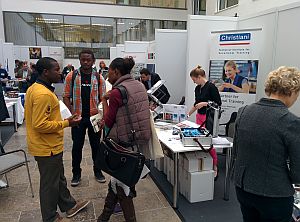
The Global Forum also included an exhibition with twenty exhibitors from the private and public sector in which they had the opportunity to present their activities and products in the area of TVET. The exhibition was officially opened by Wassilios Fthenakis, President of the Didacta Association. Six Didacta member companies participated, including Bosch-Rexroth, Christiani, Festo Didactic, LD Didactic, Lucas Nülle, and The CoolTool (for more information on exhibition see here.
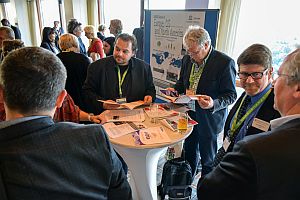 The successful implementation of TVET goals and policies requires collaborative partnerships among all key stakeholders. To provide an opportunity to strengthen such ties, the Forum included an evening networking session in which some 150 participants, representing the private and public sector, civil society and NGOs as well as academia and research, exchanged experiences among each other and with UNEVOC network members from Africa, the Arab States, Asia and the Pacific, Europe, North America, and Latin America and the Caribbean.
The successful implementation of TVET goals and policies requires collaborative partnerships among all key stakeholders. To provide an opportunity to strengthen such ties, the Forum included an evening networking session in which some 150 participants, representing the private and public sector, civil society and NGOs as well as academia and research, exchanged experiences among each other and with UNEVOC network members from Africa, the Arab States, Asia and the Pacific, Europe, North America, and Latin America and the Caribbean.
All presentations are available for download on the Documentation page.